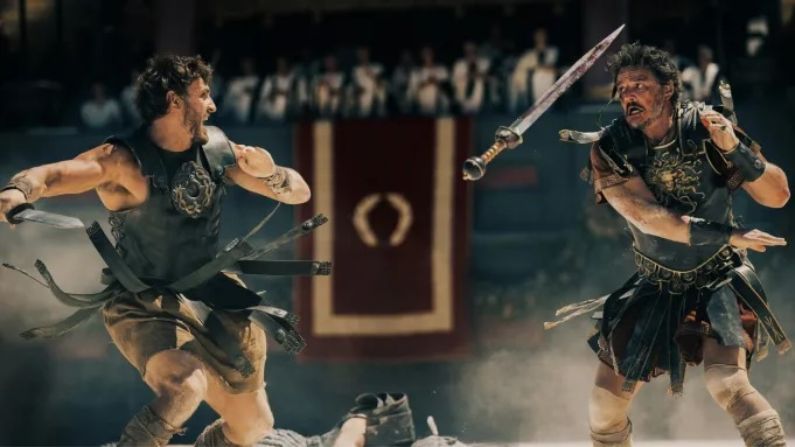It’s been 24 years since Russell Crowe asked us if we were not entertained. We were. “Gladiator” was a global phenomenon in 2000 and an Oscar winner for Best Picture in 2001. We’ve been waiting for decades for director Ridley Scott to take us back to Rome, and it’s not the only long-awaited return of the year . Tim Burton returned to the world of “Beetlejuice” after a 36-year hiatus. That sequel, “Beetlejuice Beetlejuice,” was paralyzed by nostalgia and too beholden to the original to make it on its own. Did Ridley avoid the same fate?
“Gladiator II,” out now in theaters, takes place about 16 years after the events of the first film. Rome is a mess, with a couple of corrupt brothers sharing the throne and wars of conquest draining the city of coin and good men. One such campaign of empire brings us to the land of Numidia and there we meet a tough young man called Hanno. The Romans take the city, and Hanno is forced into slavery and, in short order, into an arena as a fighter. Does this sound familiar? This is not where the similarities to the first film end. They are constant, almost devotional, and do not always benefit this new story.
“Gladiator II” is, pure and simple, an homage to the original, with a script that wears its heartfelt respect on its sleeve. It feels good to reinhabit the space we fell in love with back in 2000, but there doesn’t seem to be any interest in rewarding us with a fresh narrative for coming back. In fact, it would be almost impossible to spoil this plot for anyone who saw “Gladiator” back in the day. They are so similar, they might as well be the same.
Don’t get me wrong. I said it felt good to be back in Ridley Scott’s Rome and I meant it. The cinematography is stunning. The fighting is stylish and brutal. And Paul Mescal has a very convincing leading man aura. I could have done with a lot more Pedro Pascal and a little less Denzel Washington in this script, but the acting in “Gladiator II” is stronger than the writing across the board. Speaking of that writing, the motivations of the characters are often inconsistent, with quick emotional and philosophical shifts that strain credulity. It’s as if some
important establishing scenes got cut. Mescal is mad-dog bloodthirsty one moment, and prophecy-fulfilling heroic the next. It doesn’t always make sense. The scene setting, while too familiar, is excellent. The city looks spectacular and the strong advancements in CGI are very apparent when compared to what was happening back at the turn of the current century. The opening battle in Numidia, in particular, is breathtaking in both scope and intimacy. Yes, it is a retread of Russel Crowe’s fight with the Germanic hordes at the top of his story, but this kind of historic military spectacle is something Ridley Scott does very well indeed. Almost well enough to make you forget you’ve seen it before.
Ridley Scott is clearly very proud of his earlier masterpiece, and I think he should be. But through flashbacks and the words of his characters, he mentions Russell Crowe’s Maximus about every 10 of “Gladiator II”’s 148 minutes. It suffocates his efforts, and I wish he had done it less. After over 20 years, I was hoping for a movie that built on the first one, not one that simply depended on it. Like “Beetlejuice Beetlejuice”, “Gladiator II” is too indentured to its famous forebear. The continuous callbacks and shot-for-shot recreations don’t do the franchise, assuming it hopes to be one, any favors.






